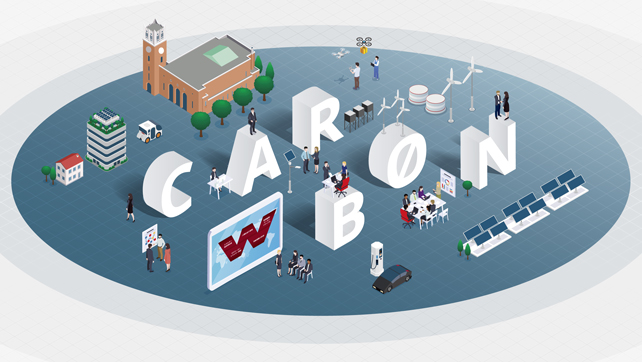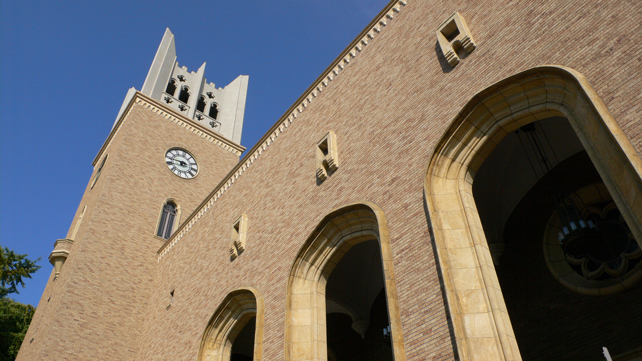Accomplishments
WASEDA’S TGU PROJECT, 10 YEARS OF ACHIEVEMENTS
Develop education and research programs to solve global challenges and innovate the future
Proactive reforms involving model units rolled out across and entrenched in the university
Waseda Ocean defined seven internationally competitive research areas as model units. These units then received concentrated, proactive, and strategic investment to raise Waseda’s international presence therein.
For the model units, Waseda Ocean pioneered the use of the joint appointment system (JA) and visiting faculty system to invite talented researchers in each of the research fields from around the world and thus actively promote international co-taught programs for students and international joint research with Waseda’s faculty. Over the last 10 years, the project has appointed over 300 JA and visiting faculty. These model unit initiatives have encouraged faculties that do not work through the model units to recruit JA and visiting faculty independently, leading to university-wide use of JA and visiting faculty system, such that these university systems are now entrenched.
With the appointment of JA and visiting faculty, international joint education and international symposia were held, fostering rapport with overseas institutions and culminating in cooperation programs between undergraduate departments and graduate schools (as of March 2024, the double-degree programs are 17, cotutelle programs 6, joint supervision programs 6, and combined degree programs 1). Thus, the reforms involving the model units have significantly contributed to building a global university network and, in turn, a system for nurturing researchers.
In March 2025 and beyond, the model units will continue to source their own funds and engage in initiatives to raise Waseda’s international presence in the relevant fields.

Developing university-wide programs for addressing worldwide issues
On November 1, 2021, Waseda unveiled the Waseda Carbon Net Zero Challenge 2030s, a balanced vision for carbon neutrality with three components: Advanced Research and Development to Realize Carbon Neutrality, Nurturing Human Resources that Contribute to Carbon Neutrality, and Achieving a Carbon Neutral Campus.
Under this declaration, Waseda has committed to developing interdisciplinary programs that combine humanities and STEM disciplines to nurture outstanding talent who can drive the carbon transition. Having launched a program for undergraduates in AY 2022, Waseda launched a program for graduate students in AY 2024, including subjects of seven model units. The units engage in initiatives that will be developed into university-wide programs for addressing global climate issues.

Expediting the international exchange of researchers
Over 10 years, Waseda has appointed top-level researchers from around the world, including JA and visiting faculty, to create more opportunities for student guidance and provide students with world-class education. The invited researchers have actively engaged in international joint research, which has resulted in a large increase in the number of international, jointly authored research papers from university faculty and contributed to quality enhancement in university education and research.
The model units have actively engaged in initiatives to stimulate international academic networking. The “Global Japanese Studies” unit ran a UCLA-Waseda research fellowship program; the “Positive / Empirical Analysis of Political Economy” unit held a summer session with the University of Essex; the “Health Promotion: The Joy of Sports and Exercise” unit has participated in the Global Sport University Network (GSUN) since its foundation; the “Frontier of Embodiment Informatics: ICT and Robotics” unit concluded an exchange agreement with the Alan Turing Institute; the “Energy and Nanomaterials” unit systematized an educational system structure to enable international cooperation in education; the “Multiscale Analysis, Modelling and Simulation” unit co-published the lecture notes and collected papers of JA faculty and Waseda’s faculty; and the Global Asia Research Center launched the International Association for Reconciliation Studies.
Waseda has also actively engaged in faculty-development programs with the University of Washington and other universities. The faculty who participated in these programs brought world-class instruction strategies back with them, and we created opportunities for them to share their strategies in Waseda, leading to improvements in teaching ability of Waseda’s faculty and improvements in educational quality.
By providing such opportunities for exchanges and networking in both education and research, Waseda has promoted the global mobility of its faculty and further expedited knowledge circulation.

Globalize education and research programs
Increasing students’ international mobility
Having previously introduced a quota system, Waseda, in March 2018, expanded the system to cover the entire university and unified the lecture calendar with the quotas. Waseda also conducted a number of organizational reforms to improve the global mobility of its students. It added new subjects for the quota of students who have just returned from a study-abroad program, introduced a course-completion system that enables registration for new subjects during quota and temporary suspensions of courses at a quota level, and promoted short overseas study programs using the summer quota.
Waseda also expanded its English-language degree programs, introduced multilateral entrance exam system (by providing an admissions-office exam [with no subject-based written test] and a thinking ability test), and increased the intake of International Baccalaureate-based applicants, thereby attracting students from many different backgrounds, so as to gain a more diverse mixture of students.
While students’ international mobility was temporarily curtailed by the pandemic, Waseda continued international exchanges, setting up its online international exchange initiatives under the Global Online Academic Learning (GOAL) project. Amid the travel restrictions, plenty of students engaged in virtual academic interactions, including in the Virtual Students Exchange Programs run by the Association of Pacific Rim Universities, online classes with Peking University and Fudan University, and Mini-COIL sessions with a partner university in the USA. These virtual initiatives provided meaningful international encounters to students who had desired international interaction but were unable to study abroad under the circumstances, those who had a vague interest but were unsure of how to proceed, and those who wanted to deepen their international interaction further through overseas study.

Attracting talented students from abroad
At the start of the TGU project, we established an English-language degree program in six undergraduate and 11 graduate schools to help expand such programs. In AY 2023, English-language degree programs are now provided in seven undergraduate and 16 graduate schools, with 4,209 students enrolled a huge increase compared to the figure of 2,661 in AY 2013. In AY 2023, the number of full-time overseas students enrolled in an English-language degree program has risen by over a thousand, from 4,594 in AY 2013 to 5,708. By expanding the English-language programs and overseas recruiting and increasing the applicant quota, Waseda has become an attractive destination for overseas students and, as such, now accepts many talented students from abroad.
We have used inter-university partnerships to attract overseas students. In AY 2014, we had partnerships with 422 institutions in 79 countries; in AY 2023, we have partnerships with 867 institutions in 91 countries. We have also seen an increase in the number of overseas students admitted through exchange programs. In AY 2014, such students were 426; although it dipped during the pandemic, in AY 2023, it was up to 1,479.
Thus, Waseda now accepts many talented students from abroad. By accepting such students and having them interact with their peers in Japan, we are nurturing diverse global leaders for the world of tomorrow.

Producing alumni equipped for global leadership
One of the metrics used in the QS World University Rankings 2024 (released June 2023) is employer reputation, which measures the employability of the university’s alumni. In this metric, Waseda stands in 24th place, ascending in the ranks year by year. Having committed in Waseda Vision 150, our vision for 2032 to nurture global leaders who can work for the interests of humankind anywhere in the world, we regard this increase in rank as a testament to the success of our efforts to attract talented students and provide a learning environment that equips them for global leadership at the highest level.

Fundamentally reform the faculty recruitment system and university governance
Attracting world-class teaching talent
Since the TGU project began, Waseda has acted to establish an institutional infrastructure that attracts outstanding teaching talent and actively attract teaching talent from abroad. These actions have included using the joint appointment system and invitation system, updating the tenure track system, and resolving to introduce a system for outstanding teaching talent and a system of incentive allowances.
We updated the tenure track system to make it more competitive. The updated system provides the same remuneration and treatment as tenured staff and offers a safety net to staff who fail the tenure screening (a retirement grace period). Since the TGU project began, we have recruited 52 teaching staff (including overseas applicants) under the tenure track system, both before and after its update, and 21 of the recruited staff have passed the tenure screening and gained tenure.
In AY 2024, we introduced a system for outstanding teaching talent and a system of incentive allowances. The first of these systems will offer a higher salary to attract outstanding teaching talent. The second will enable the remuneration structure to be flexible, set to provide allowances to staff commensurate with their performance in teaching or research.
As a result of these recruitment initiatives, we now attract top global talent; since the start of the TGU project, we have recruited teaching talent from the Massachusetts Institute of Technology, the University of Oxford, Stanford University, Princeton University, the Chinese University of Hong Kong, the University of Auckland, and National Taiwan University. The proactive model unit initiatives have contributed to attracting such talent; in some cases, a model unit recruited a professor who had interacted with our faculty as a visiting faculty, and in some cases, a tenured researcher from a famous overseas university became a tenured faculty at Waseda.

Enabling better and bolder decision-making
In AY 2018, we started inviting an incumbent professor from overseas universities and global business leaders to serve as executive or non-executive vice presidents to incorporate global perspectives into Waseda’s decisions about education and organizational matters. Waseda’s executive board has a diverse membership, ensuring that its decisions reflect a range of opinions and perspectives; it includes women vice presidents and administrative vice presidents, some of whom obtained their doctoral degree at an overseas university. We also bolstered the executive functions: in AY 2014, we created a small number of senior-executive-vice-president posts, and in AY 2022, we made it a rule to appoint one of the three senior executive vice presidents as a provost in charge of educational affairs. The provost assists the president and takes general charge of educational matters in Waseda. In July 2023, we created the post of deputy provost, who assists the provost, ensuring a more sound and effective execution of affairs.
In February 2020, we established rules for delineating authority in Waseda. By specifying the decision-making procedure at board meetings and the authority and responsibilities of board members, the rules contribute to an environment in which decisions can be made swiftly.
We also made organizational changes to enhance governance, following discussions at Waseda’s governance committee, which was established under strategic objective 4 of Waseda Vision 150, “establishing a university structure that allows [the university] to continuously evolve.” Specifically, we established an advisory body whose membership comprises individuals unaffiliated with the university. We also increased the number of auditors.
These governance reforms have enabled better and bolder decision-making, resulting in many organizational reforms for improving Waseda’s global competitiveness. These include introducing a program for outstanding teaching talent, a program of incentive allowances, and an endowed chair program; launching Waseda Endowment; and establishing the Waseda Center for a Carbon Neutral Society.

Securing the funding to drive forward reforms
After the launch of the TGU project, Waseda overhauled its income structure (increasing revenue sources and reorganizing business operations, among other things) to ensure a reasonable balance in each fiscal year. In addition, Waseda has worked to diversify its revenue source to drive forward its reforms.
The year 2018 saw the full launch of Waseda Endowment, a new long-term source of capital, representing a medium- to high-risk and medium- to high-return investment. By obtaining funds from endowments and other sources, we can increase our level of operating revenue. Revenue obtained through such means will be allocated to strategic investment budgets.
In April 2022, we accelerated an existing reform program for enhancing the quality of education and research. We also launched the Waseda Fund and started soliciting donations to the fund to help us further enhance education and research and nurture students into global leaders.
For research, we have obtained scientific research funds as a basis of research and competitive research funds to provide a structure for promoting research not dependent on tuition fees.
We managed to raise our annual external research funding form 10.2 billion yen in AY 2013 to 17 billion yen in AY 2023, far exceeding our target.
We have also acted to diversify sources of funding for university management to provide a more robust financial foundation for research and education systems. Our actions include using strategic international fundraising programs, such as accepting entrusted business (worth some 700 million yen), under a Qatar endowed chair agreement. They also include other strategic fundraising in cooperation with overseas operation bases and internal stakeholders.


